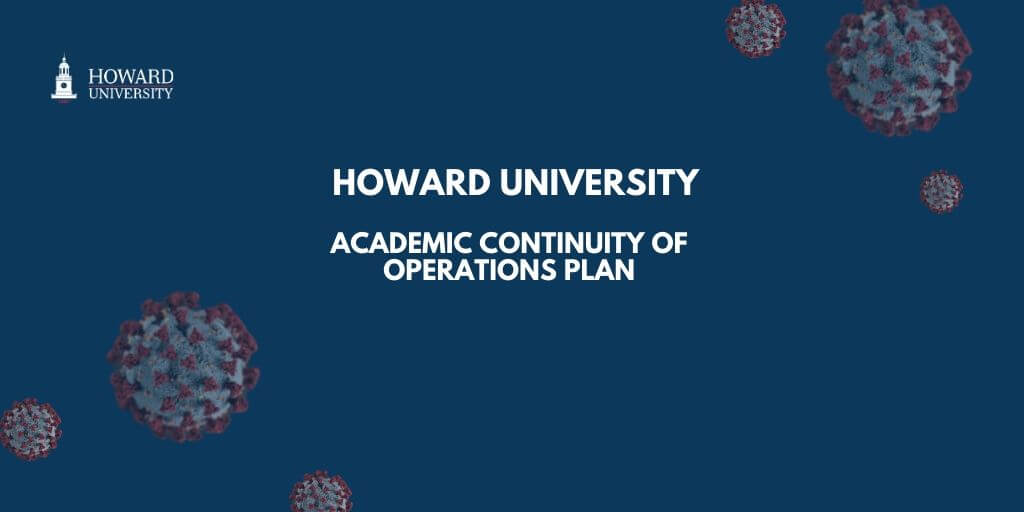
Dear Howard Community,
The University continues to closely monitor the spread of COVID-19, also known as the coronavirus, as additional cases are confirmed in the United States and other countries.
Please be assured that the University is in consistent communication with the DC Department of Health, the Centers for Disease Control and Prevention (CDC), and other academic institutions in the DC Consortium of Universities, and in the region. We are aware of the announcement of the first cases of COVID-19 in Washington, DC this past weekend, as well as the first cases in Virginia and Maryland. The DC Department of Health, in their communication also indicated “risk for community spread in the District remains low.”
At this time, no additional precautionary measures or modifications to university operations are recommended by the DC Department of Health nor the Centers for Disease Control. However, the university officials have formed a Coronavirus taskforce of experts, and are taking steps to prepare for any potential impacts on campus operations.
The university has an established Continuity of Operations Plan (COOP), that is being reviewed, and updated regarding the current COVID-19 outbreak. The DC Department of Health will also continue to provide additional recommendations if modification in our procedures, or interruption of in-person teaching modalities become warranted.
The university anticipates that we will maintain normal operations for the duration of the spring semester, unless there is significant disruption triggered by the spread of the outbreak. This decision will be made in concert with the Department of Health. Our emergency planning assumption is that we would have a two to four weeks window of time, whereby we would work with the Department of Health to determine if suspension of in-person classes or closure of administrative offices is necessary. In order to consider how this may impact faculty, students and staff, we suggest that all members of the University community think about how a potential temporary two to four-week suspension of normal operations may impact you.
If a decision is made to suspend in person instruction and/or close administrative offices, the university will provide recommendations and options to faculty for implementation of online instruction. We are aware that this may not be feasible option for certain laboratory-based, clinical and other classes. Essential personnel will continue to be maintained on campus at reduced levels. Transitions to online instruction and remote workplace environments can be implemented in a phased manner, starting with large lecture-style courses, and those that are already utilizing a significant online component.
As a matter of planning and preparedness, we encourage students, faculty, and staff to take measures as recommended for all regional and national emergency scenarios that may include possible disruptions in supply chains. As a precautionary measure, consider which medication and resources you might need if supplies are unavailable for three or more days. Shortages may include food, medicine, personal hygiene products, fuel, and public services.
As noted previously, the University will continue to operate under normal circumstances as we continually assess circumstances, and consider updates from the DC Department of Health, and CDC. Employees and students who may be immunocompromised should contact their health care provider, and either human resources, or Student Special Services, to discuss proactive plans to protect their health.
As a reminder, all University-supported, non-essential international travel for students, faculty, and staff has been temporarily suspended. This includes future group trips, spring break programs and individual travel. It also includes mandatory requests for approval of future international travel by the Provost and remains in place until further notice. Beyond the actual health risks, we are increasingly concerned about travel restrictions being implemented that may impact the return of individuals engaged in international travel. In addition to potential restrictions that may be under consideration by the federal government, foreign governments are also imposing additional border and travel controls.
As we prepare for Spring Break, we strongly discourage personal travel to jurisdictions with a CDC Level 3 (Avoid Non-essential travel) Travel Warning. Any traveler returning from these countries (and potentially other jurisdictions) is subject to a 14-day period of self-isolation at home, or other location separate from campus. If you decide to travel, please be aware that there may be limited health resources in those areas, if they are affected by coronavirus. You may be subject to governmental travel restrictions with little or no notice, and airlines may limit or cancel flights without warning. You will be subject to any restrictions in place at the time of your return, not only at the time of departure. Return to the U.S. may be difficult, and after your arrival you may be required to stay away from campus temporarily.
We understand that these travel restrictions and the uncertainty surrounding the spread of COVID-19 may be disruptive and very concerning to the members of our community. We encourage everyone to remain calm, follow advisement regarding prevention methods, and remain informed regarding changes in health and travel advisement. We will keep you informed and continue to offer the support and resources needed as circumstances change. Thank you.
Excellence in Truth and Service,
Anthony K. Wutoh, Ph.D., R.Ph.
Provost and Chief Academic Officer




